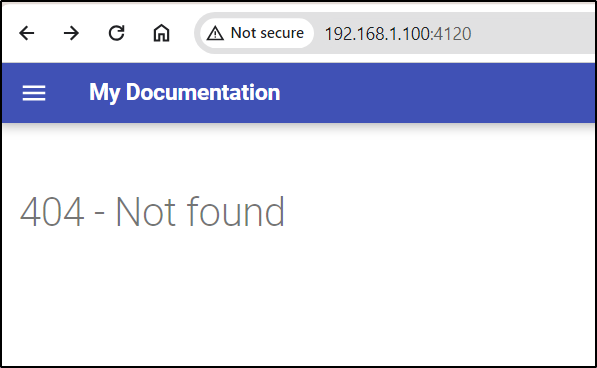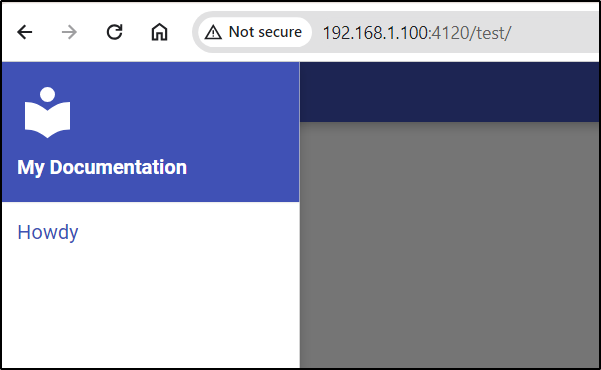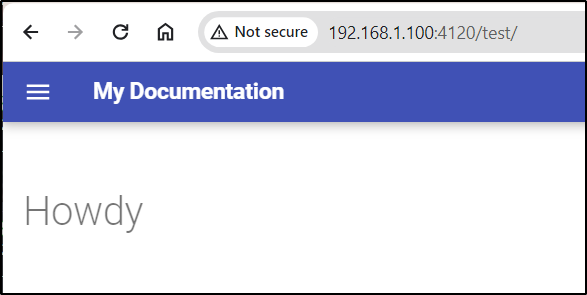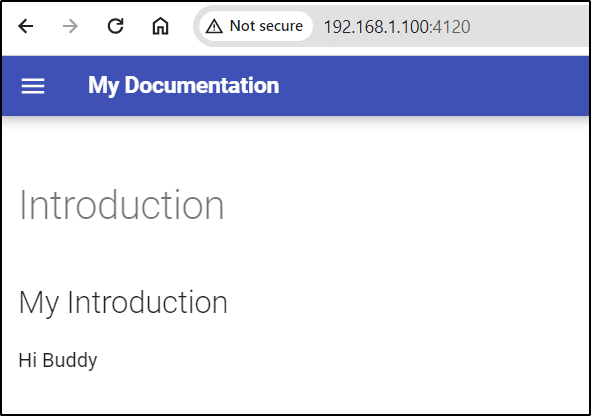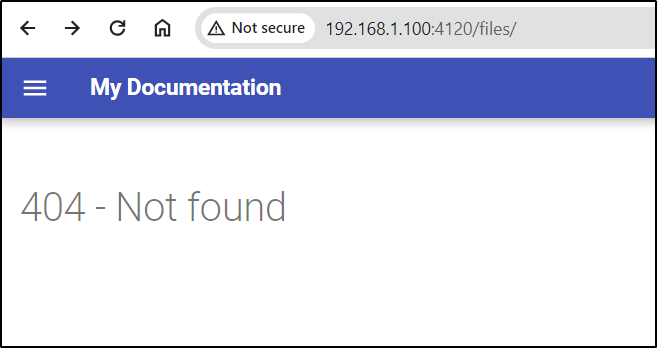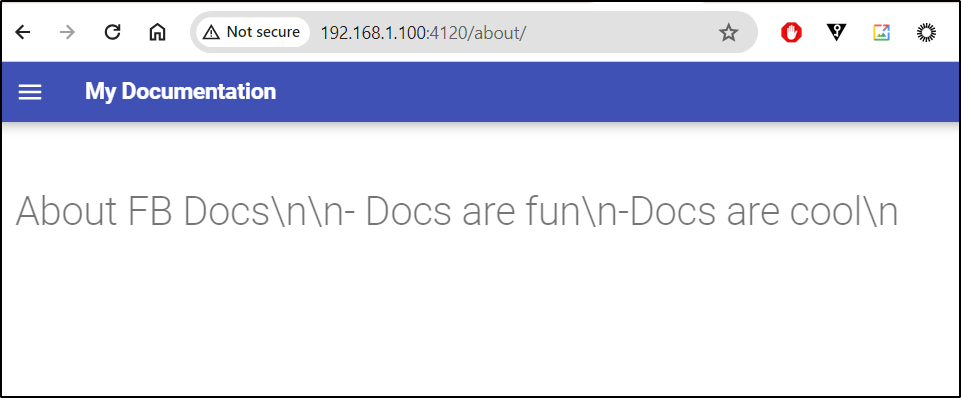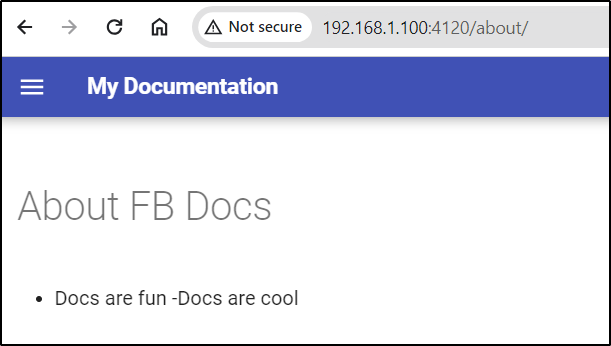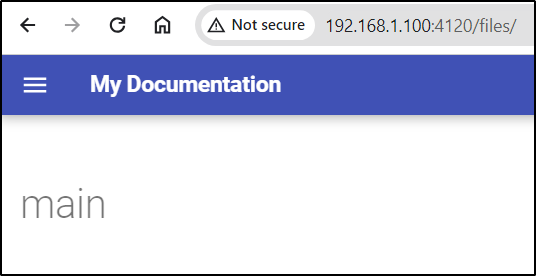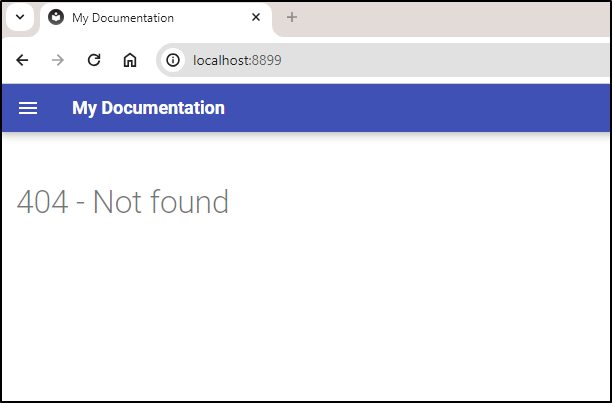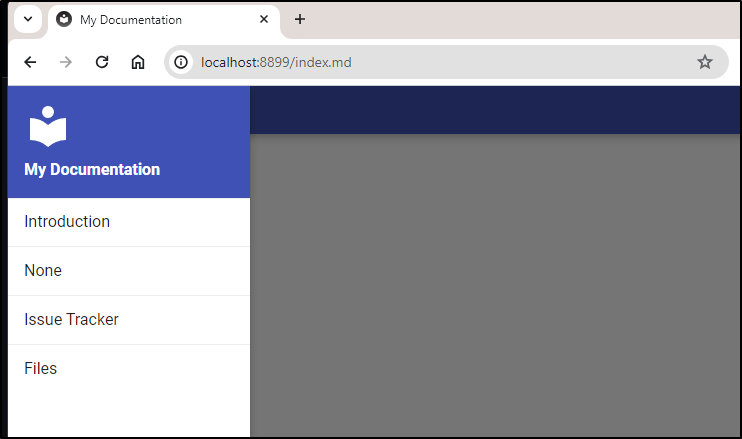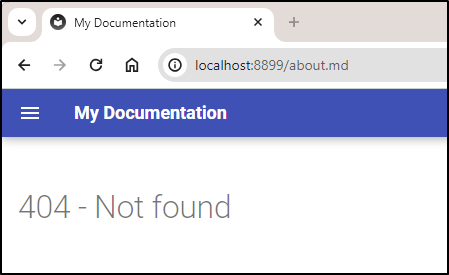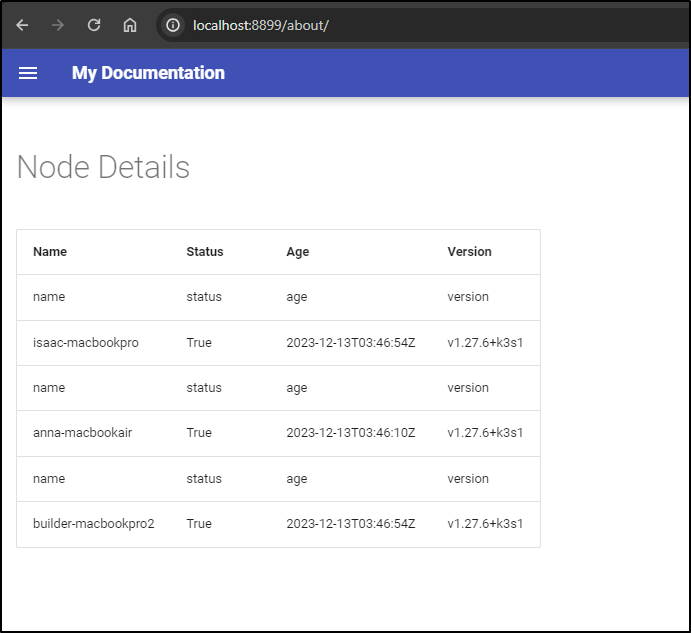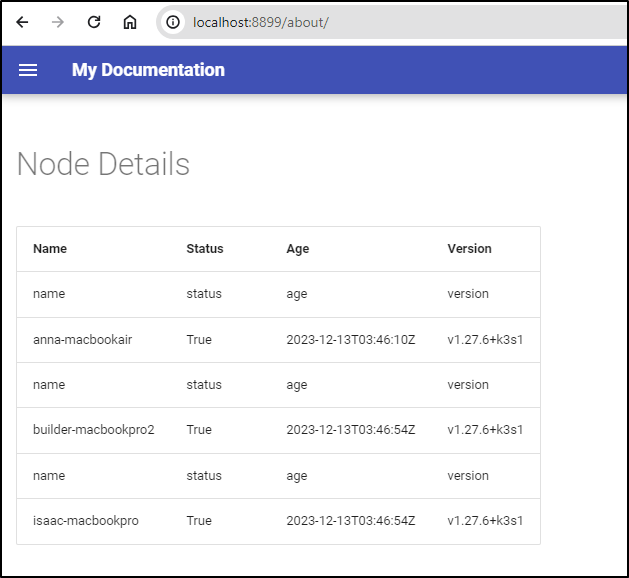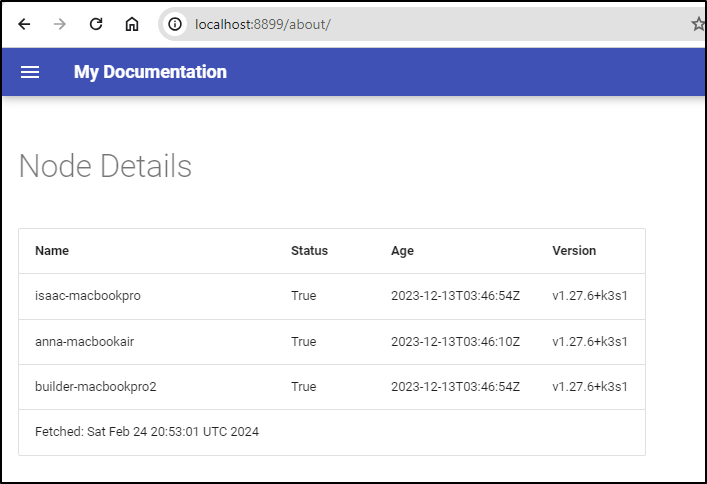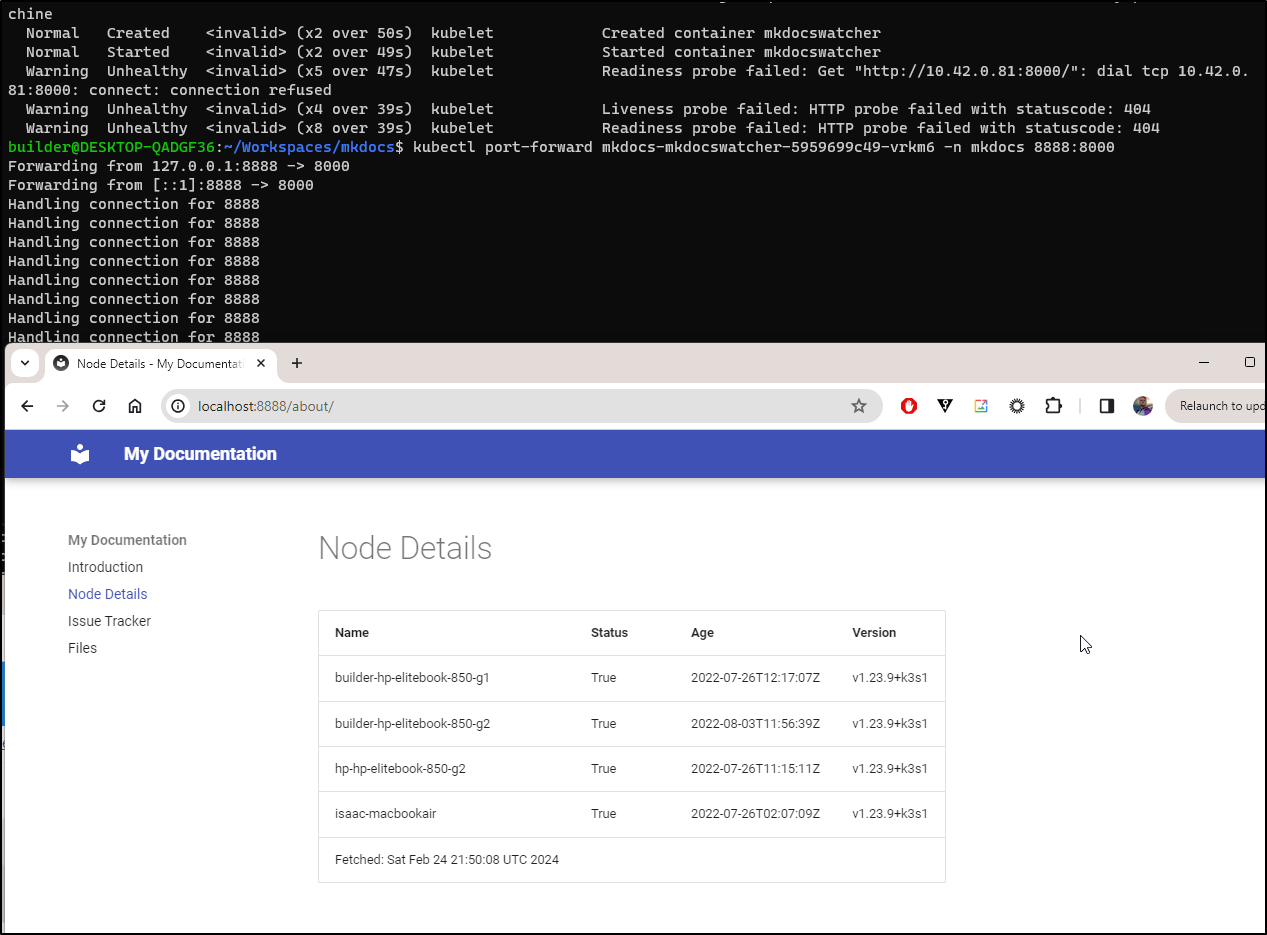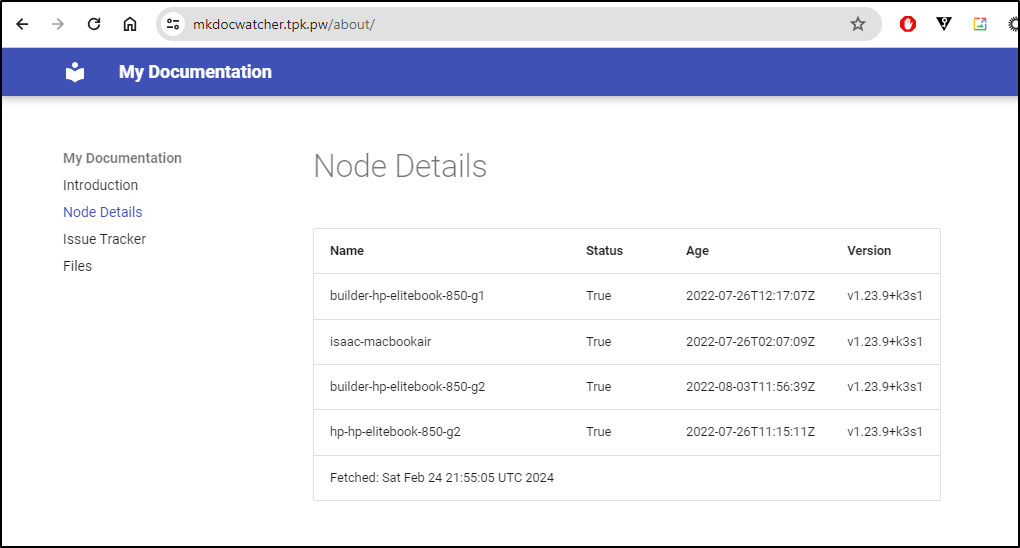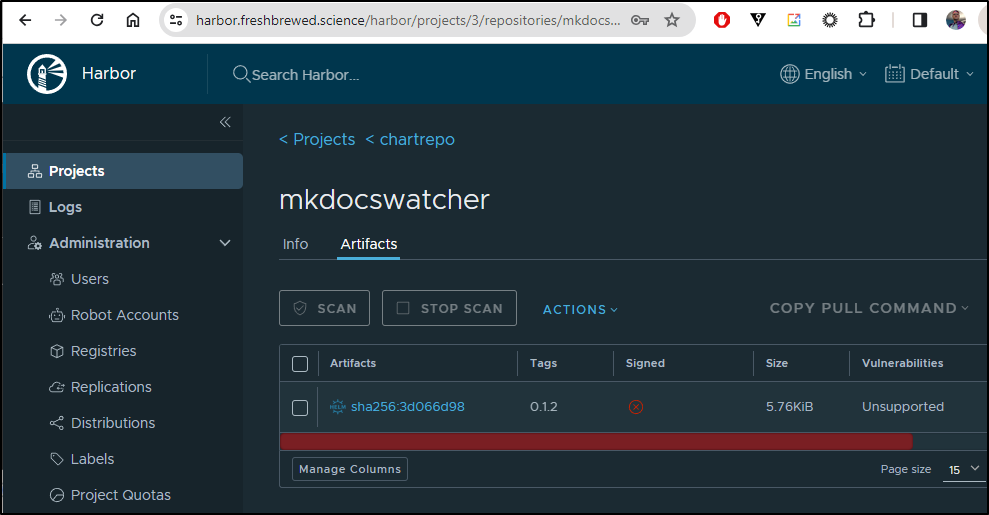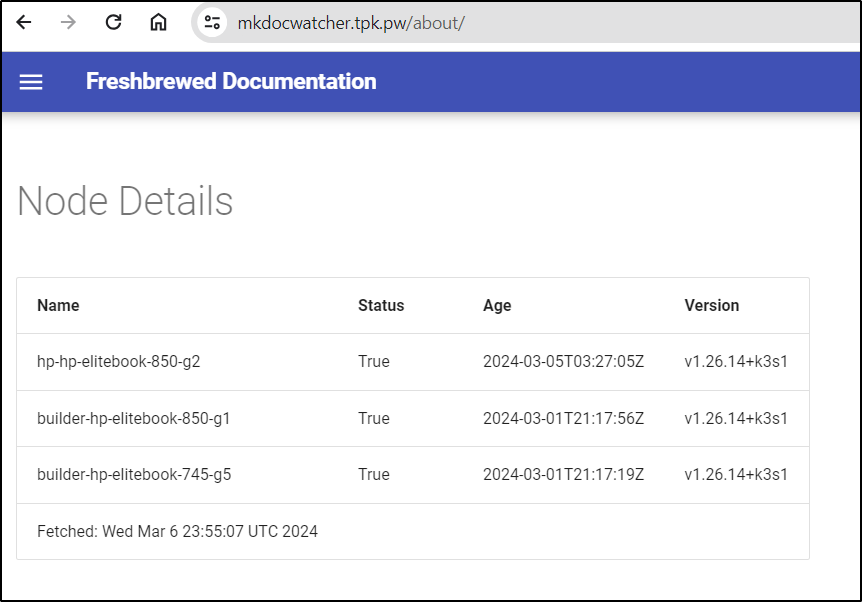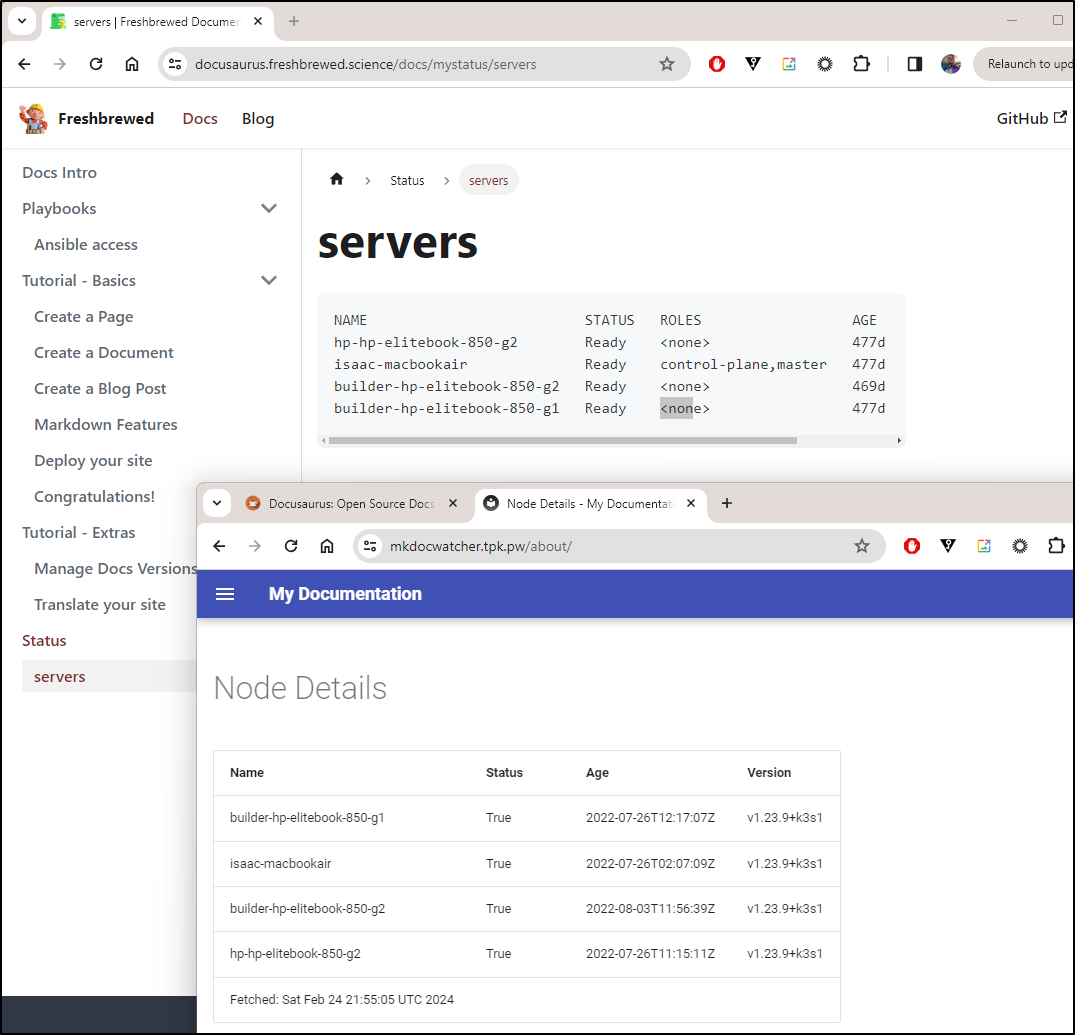Published: Mar 12, 2024 by Isaac Johnson
Material for MKDocs is an actively developed documentation framework. It’s Open-Source (MIT) and has 17.5k stars and 3.2k forks on Github. The Getting Started page has quite an amazing landing page.
One can start using it as code simply by cloning the repo and running:
$ git clone https://github.com/squidfunk/mkdocs-material.git
$ pip install -e mkdocs-material
Today we’ll dig into docker before pivoting to Kubernetes, YAML and helm. We’ll even have some fun with a new chart that can dynamically populate cluster details!
MkDocs with Docker
Let’s start with Docker
I’ll make a directory for our docs
builder@builder-T100:~/mkdocs$ pwd
/home/builder/mkdocs
builder@builder-T100:~/mkdocs$ mkdir otherdocs
builder@builder-T100:~/mkdocs$ echo "# Howdy" > ./otherdocs/test.md
builder@builder-T100:~/mkdocs$
Create a basic configuration file
builder@builder-T100:~/mkdocs$ cat mkdocs.yml
site_name: My Documentation
docs_dir: otherdocs
Now start
$ docker run -d -p 4120:8000 --name=mkdocs -v /home/builder/mkdocs:/docs:rw --restart unless-stopped squidfunk/mkdocs-material
8a6409051b61df42fca4a2b08625e898c115cbe9916b60c1ff3d92da0d708996
While we get a 404 Not Found
I can see the “Howdy” file
with contents
I’ll make something a bit better
$ echo -e "## My Introduction\n\nHi Buddy\n" > index.md
$ echo "# About FB Docs\n\n- Docs are fun\n-Docs are cool\n" > about.md
Then we can think about exposing a directory, so ill add some files there
builder@builder-T100:~/mkdocs$ mkdir files
builder@builder-T100:~/mkdocs$ echo "1" > files/1.md
builder@builder-T100:~/mkdocs$ echo "2" > files/2.md
Now to use them
$ cat mkdocs.yml
site_name: My Documentation
docs_dir: otherdocs
nav:
- Introduction: 'index.md'
- 'about.md'
- 'Issue Tracker': 'https://example.com/'
- 'Files': '/files/'
I quickly realized i neglected to put them in ‘otherdocs’ so i fixed that
builder@builder-T100:~/mkdocs$ mv index.md otherdocs/
builder@builder-T100:~/mkdocs$ mv about.md otherdocs/
builder@builder-T100:~/mkdocs$ mv files otherdocs/
The Introduction page worked
but files doesn’t work
and the about page didn’t work
That was an easy fix
builder@builder-T100:~/mkdocs$ echo -e "# About FB Docs\n\n- Docs are fun\n-Docs are cool\n" > otherdocs/about.md
And then create an index.md
builder@builder-T100:~/mkdocs/otherdocs/files$ echo "# main" > index.md
Kubernetes
At first I thought of making a simple deployment with a PVC
apiVersion: v1
kind: PersistentVolumeClaim
metadata:
name: mkdocs-pvc
spec:
accessModes:
- ReadWriteOnce
storageClassName: ""
resources:
requests:
storage: 5Gi
---
apiVersion: apps/v1
kind: Deployment
metadata:
name: mkdocs
spec:
replicas: 1
selector:
matchLabels:
app: mkdocs
template:
metadata:
labels:
app: mkdocs
spec:
containers:
- name: mkdocs
image: squidfunk/mkdocs-material
ports:
- containerPort: 8000
volumeMounts:
- name: mkdocs-storage
mountPath: /docs
volumes:
- name: mkdocs-storage
persistentVolumeClaim:
claimName: mkdocs-pvc
But then realized I would need to configure the mkdocs.yaml file
So I changed that to use a Configmap instead
$ cat mkdocs.yaml
apiVersion: v1
kind: ConfigMap
metadata:
name: mkdocs-config
data:
mkdocs.yml: |
site_name: My Documentation
docs_dir: otherdocs
nav:
- Introduction: 'index.md'
- 'about.md'
- 'Issue Tracker': 'https://example.com/'
- 'Files': '/files/'
---
apiVersion: v1
kind: PersistentVolumeClaim
metadata:
name: mkdocs-files-pvc
spec:
accessModes:
- ReadWriteOnce
resources:
requests:
storage: 1Gi
---
apiVersion: apps/v1
kind: Deployment
metadata:
name: mkdocs-deployment
spec:
replicas: 1
selector:
matchLabels:
app: mkdocs
template:
metadata:
labels:
app: mkdocs
spec:
containers:
- name: mkdocs
image: squidfunk/mkdocs-material
ports:
- containerPort: 8000
volumeMounts:
- name: config-volume
mountPath: /docs/mkdocs.yml
subPath: mkdocs.yml
- name: files-volume
mountPath: /docs/otherdocs
volumes:
- name: config-volume
configMap:
name: mkdocs-config
- name: files-volume
persistentVolumeClaim:
claimName: mkdocs-files-pvc
---
apiVersion: v1
kind: Service
metadata:
name: mkdocs-service
spec:
selector:
app: mkdocs
ports:
- protocol: TCP
port: 80
targetPort: 8000
type: LoadBalancer
Now create
$ kubectl create ns mkdocs
namespace/mkdocs created
$ kubectl apply -f ./mkdocs.yaml -n mkdocs
configmap/mkdocs-config created
persistentvolumeclaim/mkdocs-files-pvc created
deployment.apps/mkdocs-deployment created
service/mkdocs-service created
That’s now running
$ kubectl get pods -n mkdocs
NAME READY STATUS RESTARTS AGE
mkdocs-deployment-746dc6857-rc6zt 1/1 Running 0 22s
I can now test accessing the service
$ kubectl port-forward svc/mkdocs-service 8899:80 -n mkdocs
Forwarding from 127.0.0.1:8899 -> 8000
Forwarding from [::1]:8899 -> 8000
Handling connection for 8899
Handling connection for 8899
Handling connection for 8899
While my files are absent, I can at least see the configuration is good
Populating content with cronjobs
Let’s do something interesting. How about a report of node details?
We’ll start by creating a CronJob that gets the node details, converts to markdown and then stores into a configmap
$ cat nodeDetailsCron.yaml
apiVersion: batch/v1
kind: CronJob
metadata:
name: node-details-cronjob
spec:
schedule: "*/5 * * * *"
jobTemplate:
spec:
template:
spec:
containers:
- name: node-details
image: bitnami/kubectl:latest
command:
- /bin/sh
- -c
- |
NODE_DETAILS=$(kubectl get nodes -o json | jq -r '.items[] | {name: .metadata.name, status: .status.conditions[] | select(.type == "Ready") .status, age: .metadata.creationTimestamp, version: .status.nodeInfo.kubeletVersion} | @tsv' | awk 'BEGIN{print "|Name|Status|Age|Version|\n|---|---|---|---|"} {print "|" $1 "|" $2 "|" $3 "|" $4 "|"}')
echo -e "apiVersion: v1\nkind: ConfigMap\nmetadata:\n name: mkdirs-node-details\ndata:\n node-details.md: |\n # Node Details\n\n $NODE_DETAILS" | kubectl apply -f -
restartPolicy: OnFailure
$ kubectl apply -f ./nodeDetailsCron.yaml -n mkdocs
cronjob.batch/node-details-cronjob created
This initially created an error due to missing CRDs
$ kubectl logs node-details-cronjob-28479895-zxxmj -n mkdocs
Error from server (Forbidden): nodes is forbidden: User "system:serviceaccount:mkdocs:default" cannot list resource "nodes" in API group "" at the cluster scope
error: error parsing STDIN: error converting YAML to JSON: yaml: line 9: did not find expected comment or line break
I’ll grant our pod SA those permissions and try again
$ cat crdsNodeDetails.yaml
apiVersion: rbac.authorization.k8s.io/v1
kind: ClusterRole
metadata:
name: node-list-role
rules:
- apiGroups: [""]
resources: ["nodes"]
verbs: ["list"]
---
apiVersion: rbac.authorization.k8s.io/v1
kind: ClusterRoleBinding
metadata:
name: node-list-rolebinding
roleRef:
apiGroup: rbac.authorization.k8s.io
kind: ClusterRole
name: node-list-role
subjects:
- kind: ServiceAccount
name: default
namespace: mkdocs
---
apiVersion: rbac.authorization.k8s.io/v1
kind: Role
metadata:
namespace: mkdocs
name: configmap-reader
rules:
- apiGroups: [""]
resources: ["configmaps"]
verbs: ["get","edit","list","patch","create","delete"]
---
apiVersion: rbac.authorization.k8s.io/v1
kind: RoleBinding
metadata:
name: read-configmap
namespace: mkdocs
subjects:
- kind: ServiceAccount
name: default
namespace: mkdocs
roleRef:
kind: Role
name: configmap-reader
apiGroup: rbac.authorization.k8s.io
$ kubectl apply -f ./crdsNodeDetails.yaml
clusterrole.rbac.authorization.k8s.io/node-list-role unchanged
clusterrolebinding.rbac.authorization.k8s.io/node-list-rolebinding unchanged
role.rbac.authorization.k8s.io/configmap-reader created
rolebinding.rbac.authorization.k8s.io/read-configmap created
$ kubectl delete -f nodeDetailsCron.yaml -n mkdocs
cronjob.batch "node-details-cronjob" deleted
$ kubectl apply -f nodeDetailsCron.yaml -n mkdocs
cronjob.batch/node-details-cronjob created
I can now see it worked and created a configmap
$ kubectl get cm -n mkdocs
NAME DATA AGE
kube-root-ca.crt 1 55m
mkdocs-config 1 55m
mkdirs-node-details 1 2m49s
$ kubectl get cm mkdirs-node-details -n mkdocs -o yaml
apiVersion: v1
data:
node-details.md: |
# Node Details
|Name|Status|Age|Version|
|---|---|---|---|
|name|status|age|version|
|isaac-macbookpro|True|2023-12-13T03:46:54Z|v1.27.6+k3s1|
|name|status|age|version|
|anna-macbookair|True|2023-12-13T03:46:10Z|v1.27.6+k3s1|
|name|status|age|version|
|builder-macbookpro2|True|2023-12-13T03:46:54Z|v1.27.6+k3s1|
kind: ConfigMap
metadata:
annotations:
kubectl.kubernetes.io/last-applied-configuration: |
{"apiVersion":"v1","data":{"node-details.md":"# Node Details\n\n|Name|Status|Age|Version|\n|---|---|---|---|\n|name|status|age|version|\n|isaac-macbookpro|True|2023-12-13T03:46:54Z|v1.27.6+k3s1|\n|name|status|age|version|\n|anna-macbookair|True|2023-12-13T03:46:10Z|v1.27.6+k3s1|\n|name|status|age|version|\n|builder-macbookpro2|True|2023-12-13T03:46:54Z|v1.27.6+k3s1|\n"},"kind":"ConfigMap","metadata":{"annotations":{},"name":"mkdirs-node-details","namespace":"mkdocs"}}
creationTimestamp: "2024-02-24T17:30:41Z"
name: mkdirs-node-details
namespace: mkdocs
resourceVersion: "45236354"
uid: e82f4e4d-c696-4946-bb8b-51ef92b5c660
While I thought I might mount the file in another PVC mount
$ cat mkdocs.yaml
apiVersion: v1
kind: ConfigMap
metadata:
name: mkdocs-config
data:
mkdocs.yml: |
site_name: My Documentation
docs_dir: otherdocs
nav:
- Introduction: 'index.md'
- 'about.md'
- 'Issue Tracker': 'https://example.com/'
- 'Files': '/files/'
---
apiVersion: v1
kind: PersistentVolumeClaim
metadata:
name: mkdocs-files-pvc
spec:
accessModes:
- ReadWriteOnce
resources:
requests:
storage: 1Gi
---
apiVersion: apps/v1
kind: Deployment
metadata:
name: mkdocs-deployment
spec:
replicas: 1
selector:
matchLabels:
app: mkdocs
template:
metadata:
labels:
app: mkdocs
spec:
containers:
- name: mkdocs
image: squidfunk/mkdocs-material
ports:
- containerPort: 8000
volumeMounts:
- name: config-volume
mountPath: /docs/mkdocs.yml
subPath: mkdocs.yml
- name: config-volume-nodedetails
mountPath: /docs/otherdocs/about.md
subPath: node-details.md
- name: files-volume
mountPath: /docs/otherdocs
volumes:
- name: config-volume
configMap:
name: mkdocs-config
- name: config-volume-nodedetails
configMap:
name: mkdirs-node-details
- name: files-volume
persistentVolumeClaim:
claimName: mkdocs-files-pvc
---
apiVersion: v1
kind: Service
metadata:
name: mkdocs-service
spec:
selector:
app: mkdocs
ports:
- protocol: TCP
port: 80
targetPort: 8000
type: LoadBalancer
That did not work
$ kubectl exec -it mkdocs-deployment-746dc6857-7vmh5 -n mkdocs -- /bin/sh
/docs # ls
mkdocs.yml otherdocs
/docs # ls otherdocs/
/docs #
However, I can create a sym link at startup to solve this
$ cat mkdocs.yaml
apiVersion: v1
kind: ConfigMap
metadata:
name: mkdocs-config
data:
mkdocs.yml: |
site_name: My Documentation
docs_dir: otherdocs
nav:
- Introduction: 'index.md'
- 'about.md'
- 'Issue Tracker': 'https://example.com/'
- 'Files': '/files/'
---
apiVersion: v1
kind: PersistentVolumeClaim
metadata:
name: mkdocs-files-pvc
spec:
accessModes:
- ReadWriteOnce
resources:
requests:
storage: 1Gi
---
apiVersion: apps/v1
kind: Deployment
metadata:
name: mkdocs-deployment
spec:
replicas: 1
selector:
matchLabels:
app: mkdocs
template:
metadata:
labels:
app: mkdocs
spec:
containers:
- name: mkdocs
image: squidfunk/mkdocs-material
ports:
- containerPort: 8000
volumeMounts:
- name: config-volume
mountPath: /docs/mkdocs.yml
subPath: mkdocs.yml
- name: config-volume-nodedetails
mountPath: /docs/about.md
subPath: node-details.md
- name: files-volume
mountPath: /docs/otherdocs
lifecycle:
postStart:
exec:
command: ["/bin/sh", "-c", "ln -s /docs/about.md /docs/otherdocs/about.md"]
volumes:
- name: config-volume
configMap:
name: mkdocs-config
- name: config-volume-nodedetails
configMap:
name: mkdirs-node-details
- name: files-volume
persistentVolumeClaim:
claimName: mkdocs-files-pvc
---
apiVersion: v1
kind: Service
metadata:
name: mkdocs-service
spec:
selector:
app: mkdocs
ports:
- protocol: TCP
port: 80
targetPort: 8000
type: LoadBalancer
$ kubectl delete deployment mkdocs-deployment -n mkdocs && kubectl apply -f ./mkdocs.yaml -n mkdocs
deployment.apps "mkdocs-deployment" deleted
configmap/mkdocs-config unchanged
persistentvolumeclaim/mkdocs-files-pvc unchanged
deployment.apps/mkdocs-deployment created
service/mkdocs-service unchanged
Then test
$ kubectl port-forward svc/mkdocs-service 8899:80 -n mkdocs
Forwarding from 127.0.0.1:8899 -> 8000
Forwarding from [::1]:8899 -> 8000
Handling connection for 8899
Handling connection for 8899
This worked, but would only update if I manually rotated the pod
$ kubectl get pods -n mkdocs
NAME READY STATUS RESTARTS AGE
mkdocs-deployment-84594df66-gl4ft 1/1 Running 0 103m
node-details-cronjob-28480044-bknhk 0/1 Completed 0 3m1s
node-details-cronjob-28480045-57xqc 0/1 Completed 0 2m1s
node-details-cronjob-28480046-rdn64 0/1 Completed 0 61s
node-details-cronjob-28480047-8f556 0/1 ContainerCreating 0 1s
I’ll update the CRDs to let the pod rotate other pods in the namespace
$ cat crdsNodeDetails.yaml
apiVersion: rbac.authorization.k8s.io/v1
kind: ClusterRole
metadata:
name: node-list-role
rules:
- apiGroups: [""]
resources: ["nodes"]
verbs: ["list"]
---
apiVersion: rbac.authorization.k8s.io/v1
kind: ClusterRoleBinding
metadata:
name: node-list-rolebinding
roleRef:
apiGroup: rbac.authorization.k8s.io
kind: ClusterRole
name: node-list-role
subjects:
- kind: ServiceAccount
name: default
namespace: mkdocs
---
apiVersion: rbac.authorization.k8s.io/v1
kind: Role
metadata:
namespace: mkdocs
name: configmap-reader
rules:
- apiGroups: [""]
resources: ["configmaps"]
verbs: ["get","edit","list","patch","create","delete"]
---
apiVersion: rbac.authorization.k8s.io/v1
kind: RoleBinding
metadata:
name: read-configmap
namespace: mkdocs
subjects:
- kind: ServiceAccount
name: default
namespace: mkdocs
roleRef:
kind: Role
name: configmap-reader
apiGroup: rbac.authorization.k8s.io
---
apiVersion: rbac.authorization.k8s.io/v1
kind: Role
metadata:
namespace: mkdocs
name: podrotater
rules:
- apiGroups: [""]
resources: ["pods"]
verbs: ["get","edit","list","patch","create","delete"]
---
apiVersion: rbac.authorization.k8s.io/v1
kind: RoleBinding
metadata:
name: podrotater-role
namespace: mkdocs
subjects:
- kind: ServiceAccount
name: default
namespace: mkdocs
roleRef:
kind: Role
name: podrotater
apiGroup: rbac.authorization.k8s.io
$ kubectl apply -f crdsNodeDetails.yaml
clusterrole.rbac.authorization.k8s.io/node-list-role unchanged
clusterrolebinding.rbac.authorization.k8s.io/node-list-rolebinding unchanged
role.rbac.authorization.k8s.io/configmap-reader unchanged
rolebinding.rbac.authorization.k8s.io/read-configmap unchanged
role.rbac.authorization.k8s.io/podrotater created
rolebinding.rbac.authorization.k8s.io/podrotater-role created
I’ll then update to bounce pods after update
$ cat nodeDetailsCron.yaml
apiVersion: batch/v1
kind: CronJob
metadata:
name: node-details-cronjob
spec:
schedule: "* * * * *"
jobTemplate:
spec:
template:
spec:
containers:
- name: node-details
image: bitnami/kubectl:latest
command:
- /bin/sh
- -c
- |
NODE_DETAILS=$(kubectl get nodes -o json | jq -r '.items[] | {name: .metadata.name, status: .status.conditions[] | select(.type == "Ready") .status, age: .metadata.creationTimestamp, version: .status.nodeInfo.kubeletVersion} | (keys_unsorted, [.[]]) | @tsv' | awk 'BEGIN{print "|Name|Status|Age|Version|\n |---|---|---|---|"} {print " |" $1 "|" $2 "|" $3 "|" $4 "|"}')
echo "apiVersion: v1\nkind: ConfigMap\nmetadata:\n name: mkdirs-node-details\ndata:\n node-details.md: |\n # Node Details\n\n $NODE_DETAILS" | kubectl apply -f -
kubectl delete pods -l app=mkdocs
restartPolicy: OnFailure
$ kubectl delete -f ./nodeDetailsCron.yaml -n mkdocs && sleep 1 && kubectl apply -f ./nodeDetailsCron.yaml -n mkdocs
cronjob.batch "node-details-cronjob" deleted
cronjob.batch/node-details-cronjob created
I tried a readinessProbe:
readinessProbe:
exec:
command: ["/bin/sh", "-c", "ln -s /docs/about.md /docs/otherdocs/about.md && exit 0"]
initialDelaySeconds: 5
periodSeconds: 2
timeoutSeconds: 1
successThreshold: 2
failureThreshold: 10
But that didn’t seem to work
NAME READY STATUS RESTARTS AGE
mkdocs-deployment-55545bdf9-dcvsd 0/1 Running 0 53s
I had to remove the old symbolic links stuck in the PV as it was blocking the probes
$ kubectl exec -it mkdocs-deployment-69c8dd564d-fcg8t -n mkdocs -- /bin/sh
/docs # rm -f ./otherdocs/about.md
/docs # rm -f ./otherdocs/about.m
/docs # exit
I tweaked the deployment to copy and exit.
$ cat mkdocs.yaml
apiVersion: v1
kind: ConfigMap
metadata:
name: mkdocs-config
data:
mkdocs.yml: |
site_name: My Documentation
docs_dir: otherdocs
nav:
- Introduction: 'index.md'
- 'about.md'
- 'Issue Tracker': 'https://example.com/'
- 'Files': '/files/'
---
apiVersion: v1
kind: PersistentVolumeClaim
metadata:
name: mkdocs-files-pvc
spec:
accessModes:
- ReadWriteOnce
resources:
requests:
storage: 1Gi
---
apiVersion: apps/v1
kind: Deployment
metadata:
name: mkdocs-deployment
spec:
replicas: 1
selector:
matchLabels:
app: mkdocs
template:
metadata:
labels:
app: mkdocs
spec:
containers:
- name: mkdocs
image: squidfunk/mkdocs-material
ports:
- name: app-port
containerPort: 8000
volumeMounts:
- name: config-volume
mountPath: /docs/mkdocs.yml
subPath: mkdocs.yml
- name: config-volume-nodedetails
mountPath: /docs/about.md
subPath: node-details.md
- name: files-volume
mountPath: /docs/otherdocs
startupProbe:
exec:
command: ["/bin/sh", "-c", "cp -f /docs/about.md /docs/otherdocs/about.md && exit 0"]
periodSeconds: 2
timeoutSeconds: 1
failureThreshold: 10
volumes:
- name: config-volume
configMap:
name: mkdocs-config
- name: config-volume-nodedetails
configMap:
name: mkdirs-node-details
- name: files-volume
persistentVolumeClaim:
claimName: mkdocs-files-pvc
---
apiVersion: v1
kind: Service
metadata:
name: mkdocs-service
spec:
selector:
app: mkdocs
ports:
- protocol: TCP
port: 80
targetPort: 8000
type: LoadBalancer
$ kubectl delete deployment mkdocs-deployment -n mkdocs && kubectl apply -f ./mkdocs.yaml -n mkdocs
deployment.apps "mkdocs-deployment" deleted
configmap/mkdocs-config unchanged
persistentvolumeclaim/mkdocs-files-pvc unchanged
deployment.apps/mkdocs-deployment created
service/mkdocs-service unchanged
This is came up without issue
$ kubectl get pods -n mkdocs
NAME READY STATUS RESTARTS AGE
mkdocs-deployment-5c9c78f64d-gwxv4 1/1 Running 0 4m15s
I’ll hop in to check
$ kubectl port-forward svc/mkdocs-service 8899:80 -n mkdocs
Forwarding from 127.0.0.1:8899 -> 8000
Forwarding from [::1]:8899 -> 8000
Handling connection for 8899
Handling connection for 8899
This worked
I’ll add back the cron
$ kubectl apply -f nodeDetailsCron.yaml
cronjob.batch/node-details-cronjob created
Which works
Improvements
I had a couple more issues I wanted to contend with - there was a blip in cycling pods so I think a PDB and an increased replicaset would help.
You’ll notice the replica count is set to 2 and has a PDB now
$ cat mkdocs.yaml
apiVersion: v1
kind: ConfigMap
metadata:
name: mkdocs-config
data:
mkdocs.yml: |
site_name: My Documentation
docs_dir: otherdocs
nav:
- Introduction: 'index.md'
- 'about.md'
- 'Issue Tracker': 'https://example.com/'
- 'Files': '/files/'
---
apiVersion: v1
kind: PersistentVolumeClaim
metadata:
name: mkdocs-files-pvc
spec:
accessModes:
- ReadWriteOnce
resources:
requests:
storage: 1Gi
---
apiVersion: apps/v1
kind: Deployment
metadata:
name: mkdocs-deployment
spec:
replicas: 2
selector:
matchLabels:
app: mkdocs
template:
metadata:
labels:
app: mkdocs
spec:
containers:
- name: mkdocs
image: squidfunk/mkdocs-material
ports:
- name: app-port
containerPort: 8000
volumeMounts:
- name: config-volume
mountPath: /docs/mkdocs.yml
subPath: mkdocs.yml
- name: config-volume-nodedetails
mountPath: /docs/about.md
subPath: node-details.md
- name: files-volume
mountPath: /docs/otherdocs
startupProbe:
exec:
command: ["/bin/sh", "-c", "cp -f /docs/about.md /docs/otherdocs/about.md && exit 0"]
periodSeconds: 2
timeoutSeconds: 1
failureThreshold: 10
volumes:
- name: config-volume
configMap:
name: mkdocs-config
- name: config-volume-nodedetails
configMap:
name: mkdirs-node-details
- name: files-volume
persistentVolumeClaim:
claimName: mkdocs-files-pvc
---
apiVersion: v1
kind: Service
metadata:
name: mkdocs-service
spec:
selector:
app: mkdocs
ports:
- protocol: TCP
port: 80
targetPort: 8000
type: LoadBalancer
---
apiVersion: policy/v1
kind: PodDisruptionBudget
metadata:
name: mkdocs-pdb
namespace: mkdocs
spec:
minAvailable: 1
selector:
matchLabels:
app: mkdocs
$ kubectl apply -f mkdocs.yaml
configmap/mkdocs-config unchanged
persistentvolumeclaim/mkdocs-files-pvc unchanged
deployment.apps/mkdocs-deployment configured
service/mkdocs-service unchanged
poddisruptionbudget.policy/mkdocs-pdb created
I noticed some errors in the cron
pod "mkdocs-deployment-5c9c78f64d-v79w7" deleted
E0224 20:29:02.004499 27 reflector.go:147] vendor/k8s.io/client-go/tools/watch/informerwatcher.go:146: Failed to watch *unstructured.Unstructured: unknown
E0224 20:29:03.335497 27 reflector.go:147] vendor/k8s.io/client-go/tools/watch/informerwatcher.go:146: Failed to watch *unstructured.Unstructured: unknown
E0224 20:29:05.576290 27 reflector.go:147] vendor/k8s.io/client-go/tools/watch/informerwatcher.go:146: Failed to watch *unstructured.Unstructured: unknown
E0224 20:29:11.370601 27 reflector.go:147] vendor/k8s.io/client-go/tools/watch/informerwatcher.go:146: Failed to watch *unstructured.Unstructured: unknown
So i updated the CRDs
$ cat crdsNodeDetails.yaml
apiVersion: rbac.authorization.k8s.io/v1
kind: ClusterRole
metadata:
name: node-list-role
rules:
- apiGroups: [""]
resources: ["nodes"]
verbs: ["list"]
---
apiVersion: rbac.authorization.k8s.io/v1
kind: ClusterRoleBinding
metadata:
name: node-list-rolebinding
roleRef:
apiGroup: rbac.authorization.k8s.io
kind: ClusterRole
name: node-list-role
subjects:
- kind: ServiceAccount
name: default
namespace: mkdocs
---
apiVersion: rbac.authorization.k8s.io/v1
kind: Role
metadata:
namespace: mkdocs
name: configmap-reader
rules:
- apiGroups: [""]
resources: ["configmaps"]
verbs: ["get","edit","list","patch","create","delete"]
---
apiVersion: rbac.authorization.k8s.io/v1
kind: RoleBinding
metadata:
name: read-configmap
namespace: mkdocs
subjects:
- kind: ServiceAccount
name: default
namespace: mkdocs
roleRef:
kind: Role
name: configmap-reader
apiGroup: rbac.authorization.k8s.io
---
apiVersion: rbac.authorization.k8s.io/v1
kind: Role
metadata:
namespace: mkdocs
name: podrotater
rules:
- apiGroups: [""]
resources: ["pods"]
verbs: ["get","edit","list","patch","create","delete"]
- apiGroups: [""]
resources: [""]
resourceNames: ["assets-prod", "assets-test"]
verbs: ["get", "patch"]
- apiGroups: ["*"]
resources: ["*"]
verbs: ["list", "watch"]
---
apiVersion: rbac.authorization.k8s.io/v1
kind: RoleBinding
metadata:
name: podrotater-role
namespace: mkdocs
subjects:
- kind: ServiceAccount
name: default
namespace: mkdocs
roleRef:
kind: Role
name: podrotater
apiGroup: rbac.authorization.k8s.io
$ kubectl apply -f crdsNodeDetails.yaml
clusterrole.rbac.authorization.k8s.io/node-list-role unchanged
clusterrolebinding.rbac.authorization.k8s.io/node-list-rolebinding unchanged
role.rbac.authorization.k8s.io/configmap-reader unchanged
rolebinding.rbac.authorization.k8s.io/read-configmap unchanged
role.rbac.authorization.k8s.io/podrotater configured
rolebinding.rbac.authorization.k8s.io/podrotater-role unchanged
I also cleaned up the cron markdown output
$ cat nodeDetailsCron.yaml
apiVersion: batch/v1
kind: CronJob
metadata:
name: node-details-cronjob
spec:
schedule: "* * * * *"
jobTemplate:
spec:
template:
spec:
containers:
- name: node-details
image: bitnami/kubectl:latest
command:
- /bin/sh
- -c
- |
NODE_DETAILS=$(kubectl get nodes -o json | jq -r '.items[] | {name: .metadata.name, status: .status.conditions[] | select(.type == "Ready") .status, age: .metadata.creationTimestamp, version: .status.nodeInfo.kubeletVersion} | ([.[]]) | @tsv' | awk 'BEGIN{print "|Name|Status|Age|Version|\n |---|---|---|---|"} {print " |" $1 "|" $2 "|" $3 "|" $4 "|"}')
echo "apiVersion: v1\nkind: ConfigMap\nmetadata:\n name: mkdirs-node-details\ndata:\n node-details.md: |\n # Node Details\n\n $NODE_DETAILS\n Fetched: $(date)"
echo "apiVersion: v1\nkind: ConfigMap\nmetadata:\n name: mkdirs-node-details\ndata:\n node-details.md: |\n # Node Details\n\n $NODE_DETAILS\n Fetched: $(date)" | kubectl apply -f -
kubectl delete pods -l app=mkdocs
restartPolicy: OnFailure
I could now see the CRDs solved the errors in the cron logs
$ kubectl logs node-details-cronjob-28480137-shg7q -n mkdocs
apiVersion: v1
kind: ConfigMap
metadata:
name: mkdirs-node-details
data:
node-details.md: |
# Node Details
|Name|Status|Age|Version|
|---|---|---|---|
|isaac-macbookpro|True|2023-12-13T03:46:54Z|v1.27.6+k3s1|
|anna-macbookair|True|2023-12-13T03:46:10Z|v1.27.6+k3s1|
|builder-macbookpro2|True|2023-12-13T03:46:54Z|v1.27.6+k3s1|
Fetched: Sat Feb 24 20:57:01 UTC 2024
configmap/mkdirs-node-details configured
pod "mkdocs-deployment-5c9c78f64d-r84zg" deleted
I now have a nice working system:
Helm
However, it still is a mess of Kubernetes YAML
I built a helm chart and installed.
$ helm install mkdocs --create-namespace -n mkdocs ./mkdocsWatcher/
NAME: mkdocs
LAST DEPLOYED: Sat Feb 24 15:39:30 2024
NAMESPACE: mkdocs
STATUS: deployed
REVISION: 1
NOTES:
1. Get the application URL by running these commands:
export POD_NAME=$(kubectl get pods --namespace mkdocs -l "app.kubernetes.io/name=mkdocswatcher,app.kubernetes.io/instance=mkdocs" -o jsonpath="{.items[0].metadata.name}")
export CONTAINER_PORT=$(kubectl get pod --namespace mkdocs $POD_NAME -o jsonpath="{.spec.containers[0].ports[0].containerPort}")
echo "Visit http://127.0.0.1:8080 to use your application"
kubectl --namespace mkdocs port-forward $POD_NAME 8080:$CONTAINER_PORT
With the default 5min cron, it took 5 min to get my first error
NAME READY STATUS RESTARTS AGE
mkdocs-mkdocswatcher-cronjob-28480185-vp2b7 0/1 Completed 0 101s
mkdocs-mkdocswatcher-756bbcf6c5-sgpk8 0/1 ErrImagePull 0 6m32s
From the describe
Warning Failed <invalid> (x3 over 14s) kubelet Failed to pull image "squidfunk:mkdocs-material": rpc error: code = Unknown desc = failed to pull and unpack image "docker.io/library/squidfunk:mkdocs-material": failed to resolve reference "docker.io/library/squidfunk:mkdocs-material": pull access denied, repository does not exist or may require authorization: server message: insufficient_scope: authorization failed
While I see some probe failures, I can see that it is working
I fixed the probes by defining proper rediness and livenessprobes. Namely to check for the created file from the startupProbe and then that python was running
containers:
- name: {{ .Chart.Name }}
securityContext:
{{- toYaml .Values.securityContext | nindent 12 }}
image: "{{ .Values.image.repository }}:{{ .Values.image.tag | default .Chart.AppVersion }}"
imagePullPolicy: {{ .Values.image.pullPolicy }}
ports:
- name: http
containerPort: {{ .Values.service.port }}
protocol: TCP
readinessProbe:
exec:
command: ["/bin/sh", "-c", "test -f /docs/otherdocs/about.md"]
initialDelaySeconds: 5
periodSeconds: 5
failureThreshold: 3
livenessProbe:
exec:
command: ["/bin/sh", "-c", "pgrep python"]
initialDelaySeconds: 15
periodSeconds: 20
failureThreshold: 3
startupProbe:
exec:
command: ["/bin/sh", "-c", "cp -f /docs/about.md /docs/otherdocs/about.md && exit 0"]
periodSeconds: 2
timeoutSeconds: 1
failureThreshold: 10
volumeMounts:
- name: config-volume
mountPath: /docs/mkdocs.yml
subPath: mkdocs.yml
- name: config-volume-nodedetails
mountPath: /docs/about.md
subPath: node-details.md
- name: files-volume
mountPath: /docs/otherdocs
resources:
{{- toYaml .Values.resources | nindent 12 }}
A quick check showed my image was errant. I updated the values yaml
image:
repository: squidfunk/mkdocs-material
pullPolicy: IfNotPresent
# Overrides the image tag whose default is the chart appVersion.
tag: "latest"
And re-ran the install
$ helm upgrade --install mkdocs --create-namespace -n mkdocs ./mkdocsWatcher/
Release "mkdocs" has been upgraded. Happy Helming!
NAME: mkdocs
LAST DEPLOYED: Sat Feb 24 15:48:53 2024
NAMESPACE: mkdocs
STATUS: deployed
REVISION: 2
NOTES:
1. Get the application URL by running these commands:
export POD_NAME=$(kubectl get pods --namespace mkdocs -l "app.kubernetes.io/name=mkdocswatcher,app.kubernetes.io/instance=mkdocs" -o jsonpath="{.items[0].metadata.name}")
export CONTAINER_PORT=$(kubectl get pod --namespace mkdocs $POD_NAME -o jsonpath="{.spec.containers[0].ports[0].containerPort}")
echo "Visit http://127.0.0.1:8080 to use your application"
kubectl --namespace mkdocs port-forward $POD_NAME 8080:$CONTAINER_PORT
This is now looking good
$ kubectl get pods -n mkdocs
NAME READY STATUS RESTARTS AGE
mkdocs-mkdocswatcher-cronjob-28480185-vp2b7 0/1 Completed 0 14m
mkdocs-mkdocswatcher-cronjob-28480190-4pxf8 0/1 Completed 0 9m30s
mkdocs-mkdocswatcher-cronjob-28480195-fsp7c 0/1 Completed 0 4m30s
mkdocs-mkdocswatcher-774496dc87-sv4gr 1/1 Running 0 74s
Ingress
We’ve usually set A records in AWS, but let’s use Azure here.
$ az account set --subscription "Pay-As-You-Go"
$ az network dns record-set a add-record -g idjdnsrg -z tpk.pw -n mkdocwatcher -a 75.73.224.240
{
"ARecords": [
{
"ipv4Address": "75.73.224.240"
}
],
"TTL": 3600,
"etag": "c40f5a9f-c895-4070-8188-d390e4d898eb",
"fqdn": "mkdocwatcher.tpk.pw.",
"id": "/subscriptions/d955c0ba-13dc-44cf-a29a-8fed74cbb22d/resourceGroups/idjdnsrg/providers/Microsoft.Network/dnszones/tpk.pw/A/mkdocwatcher",
"name": "mkdocwatcher",
"provisioningState": "Succeeded",
"resourceGroup": "idjdnsrg",
"targetResource": {},
"type": "Microsoft.Network/dnszones/A"
}
I’ll then define and apply an ingress
$ cat ingress.yaml
apiVersion: networking.k8s.io/v1
kind: Ingress
metadata:
annotations:
cert-manager.io/cluster-issuer: azuredns-tpkpw
ingress.kubernetes.io/ssl-redirect: "true"
kubernetes.io/ingress.class: nginx
kubernetes.io/tls-acme: "true"
nginx.ingress.kubernetes.io/ssl-redirect: "true"
nginx.org/websocket-services: mkdocs-mkdocswatcher
name: mkdocs-mkdocswatcher
spec:
rules:
- host: mkdocwatcher.tpk.pw
http:
paths:
- backend:
service:
name: mkdocs-mkdocswatcher
port:
number: 8000
path: /
pathType: ImplementationSpecific
tls:
- hosts:
- mkdocwatcher.tpk.pw
secretName: mkdocs-mkdocswatcher-tls
$ kubectl apply -f ./ingress.yaml -n mkdocs
ingress.networking.k8s.io/mkdocs-mkdocswatcher created
Once I saw the cert created
$ kubectl get cert -n mkdocs
NAME READY SECRET AGE
mkdocs-mkdocswatcher-tls True mkdocs-mkdocswatcher-tls 97s
I could go to https://mkdocwatcher.tpk.pw/about/ and pull up the details
I now have something I’m satisfied enough to share.
I uploaded the chart to a new public Github repo at https://github.com/idjohnson/mkdocClusterWatcher.
Uploading helm to a CR
I’ll package my charts
$ helm package mkdocswatcher
Successfully packaged chart and saved it to: /home/builder/Workspaces/mkdocClusterWatcher/mkdocswatcher-0.1.2.tgz
Then push to Harbor
$ helm push mkdocswatcher-0.1.2.tgz oci://harbor.freshbrewed.science/chartrepo
Pushed: harbor.freshbrewed.science/chartrepo/mkdocswatcher:0.1.2
Digest: sha256:3d066d988f44bf1bbbf38a7ec0ad232dd146d552bbb02dd1a5366e4e995fd91d
We can check that we can pull it down if needed
builder@DESKTOP-QADGF36:~/Workspaces/mkdocClusterWatcher$ cd tmp/
builder@DESKTOP-QADGF36:~/Workspaces/mkdocClusterWatcher/tmp$ helm pull oci://harbor.freshbrewed.science/chartrepo/mkdocswatcher --version
0.1.2
Pulled: harbor.freshbrewed.science/chartrepo/mkdocswatcher:0.1.2
Digest: sha256:3d066d988f44bf1bbbf38a7ec0ad232dd146d552bbb02dd1a5366e4e995fd91d
builder@DESKTOP-QADGF36:~/Workspaces/mkdocClusterWatcher/tmp$ ls -ltra
total 16
drwxr-xr-x 6 builder builder 4096 Feb 24 16:37 ..
-rw-r--r-- 1 builder builder 5225 Feb 24 16:38 mkdocswatcher-0.1.2.tgz
drwxr-xr-x 2 builder builder 4096 Feb 24 16:38 .
Or install using the Harbor CR chart repo
$ helm upgrade --install mkdocs --create-namespace -n mkdocs oci://harbor.freshbrewed.science/chartrepo/mkdocswatcher
Pulled: harbor.freshbrewed.science/chartrepo/mkdocswatcher:0.1.2
Digest: sha256:3d066d988f44bf1bbbf38a7ec0ad232dd146d552bbb02dd1a5366e4e995fd91d
Release "mkdocs" has been upgraded. Happy Helming!
NAME: mkdocs
LAST DEPLOYED: Sat Feb 24 16:39:19 2024
NAMESPACE: mkdocs
STATUS: deployed
REVISION: 5
NOTES:
1. Get the application URL by running these commands:
export POD_NAME=$(kubectl get pods --namespace mkdocs -l "app.kubernetes.io/name=mkdocswatcher,app.kubernetes.io/instance=mkdocs" -o jsonpath="{.items[0].metadata.name}")
export CONTAINER_PORT=$(kubectl get pod --namespace mkdocs $POD_NAME -o jsonpath="{.spec.containers[0].ports[0].containerPort}")
echo "Visit http://127.0.0.1:8080 to use your application"
kubectl --namespace mkdocs port-forward $POD_NAME 8080:$CONTAINER_PORT
I can also go to Harbor and see the chart is there
Doing it fresh
Since I blasted my old cluster, let’s do it all again. However, this time, we can use the chart
I’ll clone and copy the values local
builder@LuiGi17:~/Workspaces$ git clone https://github.com/idjohnson/mkdocClusterWatcher.git
Cloning into 'mkdocClusterWatcher'...
remote: Enumerating objects: 31, done.
remote: Counting objects: 100% (31/31), done.
remote: Compressing objects: 100% (27/27), done.
remote: Total 31 (delta 4), reused 27 (delta 3), pack-reused 0
Receiving objects: 100% (31/31), 22.54 KiB | 427.00 KiB/s, done.
Resolving deltas: 100% (4/4), done.
builder@LuiGi17:~/Workspaces$ cd mkdocClusterWatcher/
builder@LuiGi17:~/Workspaces/mkdocClusterWatcher$ ls
LICENSE README.md mkdocswatcher yaml
builder@LuiGi17:~/Workspaces/mkdocClusterWatcher$ cp ./mkdocswatcher/values.yaml ./
I can now tweak the values that are unique for my deployment
$ cat values.yaml
mkdocsConfig: |
site_name: Freshbrewed Documentation
docs_dir: otherdocs
nav:
- Introduction: 'index.md'
- 'about.md'
- 'Issue Tracker': 'https://example.com/'
- 'Files': '/files/'
ingress:
enabled: true
className: ""
annotations:
cert-manager.io/cluster-issuer: azuredns-tpkpw
ingress.kubernetes.io/ssl-redirect: "true"
kubernetes.io/ingress.class: nginx
kubernetes.io/tls-acme: "true"
nginx.ingress.kubernetes.io/ssl-redirect: "true"
hosts:
- host: mkdocwatcher.tpk.pw
paths:
- path: /
pathType: ImplementationSpecific
tls:
- secretName: mkdockwatcher-tls
hosts:
- mkdocwatcher.tpk.pw
cronjob:
schedule: "*/5 * * * *"
pvc:
storageClassName: managed-nfs-storage
size: 5Gi
Then install
$ helm install mkdocswatcher -n mkdocswatcher --create-namespace -f ./values.yaml ./mkdocswatcher/
NAME: mkdocswatcher
LAST DEPLOYED: Wed Mar 6 17:52:30 2024
NAMESPACE: mkdocswatcher
STATUS: deployed
REVISION: 1
NOTES:
1. Get the application URL by running these commands:
https://mkdocwatcher.tpk.pw/
This worked!
However, I realized that one of the mistakes I had made on the former cluster was to leave that cron going on an fast schedule.
I can tweak that to run 15 minutes past the hour every 6 hours:
$ cat values.yaml
mkdocsConfig: |
site_name: Freshbrewed Documentation
docs_dir: otherdocs
nav:
- Introduction: 'index.md'
- 'about.md'
- 'Issue Tracker': 'https://example.com/'
- 'Files': '/files/'
ingress:
enabled: true
className: ""
annotations:
cert-manager.io/cluster-issuer: azuredns-tpkpw
ingress.kubernetes.io/ssl-redirect: "true"
kubernetes.io/ingress.class: nginx
kubernetes.io/tls-acme: "true"
nginx.ingress.kubernetes.io/ssl-redirect: "true"
hosts:
- host: mkdocwatcher.tpk.pw
paths:
- path: /
pathType: ImplementationSpecific
tls:
- secretName: mkdockwatcher-tls
hosts:
- mkdocwatcher.tpk.pw
cronjob:
schedule: "15 */4 * * *"
pvc:
storageClassName: managed-nfs-storage
size: 5Gi
$ helm upgrade --install mkdocswatcher -n mkdocswatcher --create-namespace -f ./values.yaml ./mkdocswatcher/
Release "mkdocswatcher" has been upgraded. Happy Helming!
NAME: mkdocswatcher
LAST DEPLOYED: Wed Mar 6 18:06:43 2024
NAMESPACE: mkdocswatcher
STATUS: deployed
REVISION: 3
NOTES:
1. Get the application URL by running these commands:
https://mkdocwatcher.tpk.pw/
And we see it has been adjusted
$ kubectl get cronjob -n mkdocswatcher
NAME SCHEDULE SUSPEND ACTIVE LAST SCHEDULE AGE
mkdocswatcher-cronjob 15 */4 * * * False 0 2m40s 7m57s
Summary
This was really quite fun. I had started this blog one afternoon thinking I would just cover a few different related Open-Source apps like I often do for smaller tools. However, the more I played with mkdocs, the more I wanted to “try one more thing”. We often have needs for generated documentation. Back in November, I put out a two part writeup on Docusaurus. In Part 1 I covered auto generated content using configmaps as well (which is still running).
We can see they both serve similar content now
But I might lean more into the MKDocs version as it’s significantly lighter weight.


